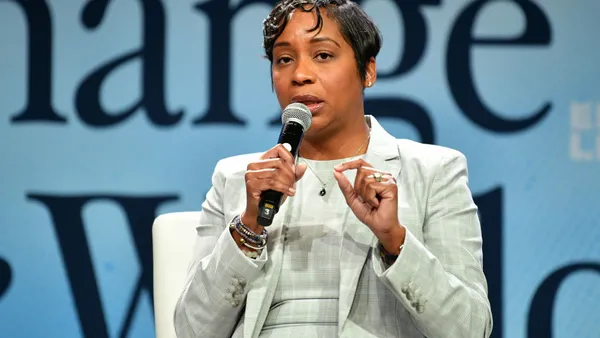Dive Brief:
- Long John Silver's will pay $200,000 to settle allegations by the U.S. Equal Employment Opportunity Commission that two male managers at a Centralia, Illinois, restaurant offensively touched, made lewd comments to and sexually propositioned female employees, including a 17-year-old worker who was allegedly forced to quit after she complained (EEOC v. LJS Opco Two, LLC d/b/a Long John Silver's, No 3:21-cv-00717 (S.D. Ill March 2022)).
- The EEOC said the fast food chain failed to train staff about its sexual harassment policies and didn't discipline the managers after employees complained. One of the managers allegedly sent the 17-year-old explicit videos of himself and propositioned her. After she complained, the company reduced her hours, refused to investigate her complaint and constructively discharged her, the lawsuit alleged.
- "We were extremely disappointed to learn of the allegations that led to this settlement," Long John Silver's said in a statement released to HR Dive. "We have worked closely with the EEOC and local crew members to investigate and take corrective action. The employees involved in the matter are no longer with the organization. Additionally, we strengthened our workplace safety training — with particular emphasis on harassment, diversity, and inclusion — across the enterprise. We remain steadfast in our commitment to providing a safe workplace for all."
Dive Insight:
As some of the largest private employers in the U.S., restaurant chains see their fair share of EEOC complaints related to harassment. In 2021, the EEOC claimed a manager at an IHOP restaurant subjected women, including teen workers, to sexual harassment in violation of Title VII. In March, the EEOC sued Chipotle claiming two employees in Washington State left their jobs due to sexual harassment. Carrabba's agreed to pay $690,000 in December to settle a sexual harassment complaint from the EEOC related to a manger sexually harassing female workers.
Title VII harassment cases alleging that a manager or supervisor sexually or otherwise unlawfully harassed a subordinate commonly focus on whether the employer took "reasonable care" to prevent and promptly correct the unlawful harassment.
Although reasonable care depends on the circumstances, certain practices are important. In a nutshell, these are establishing, disseminating and enforcing an effective anti-harassment policy, the EEOC said in a guidance document. To be effective, the policy should include a clear explanation of prohibited conduct and an accessible complaint process. Employers should also make clear to employees that they won't tolerate harassment or retaliation against those who report harassment. The EEOC says it's also good practice to ensure that managers understand their responsibility to stop, address and prevent harassment.
But having a good policy isn't enough. Employers may still get in trouble if they don't enforce it, the EEOC guidance warns. This can happen when an employer doesn't promptly respond to, investigate and take immediate and appropriate corrective action if it determines harassment occurred.
Beyond the legal ramifications, letting harassment complaints go unanswered raises practical concerns. HR departments depend on employee complaints to correct the wrongful conduct. When HR doesn't address the complaints, it sends the message that harassment will be tolerated, causing employees to lose trust in HR, sources previously said.
The EEOC guidance points out that when employees have reason to believe the complaint process isn't effective, they're likely to avoid using it. That, in turn, can hamper HR's ability to address wrongful behavior. One solution is for HR to insist on a standardized reporting procedure that requires it to act on complaints; likewise, ensuring that HR staff maintain a consistent and calm approach to harassment complaints helps ease trust issues and encourages employees to report the alleged misconduct.














